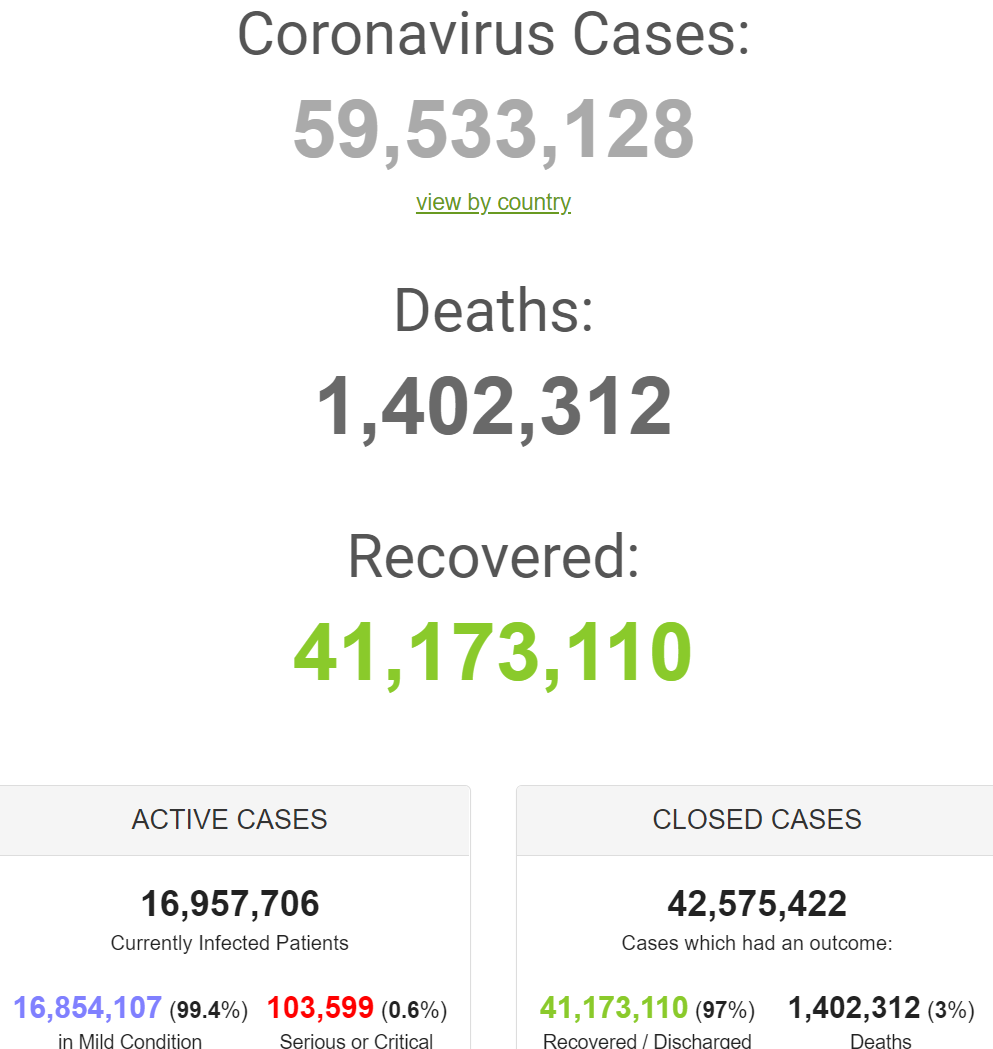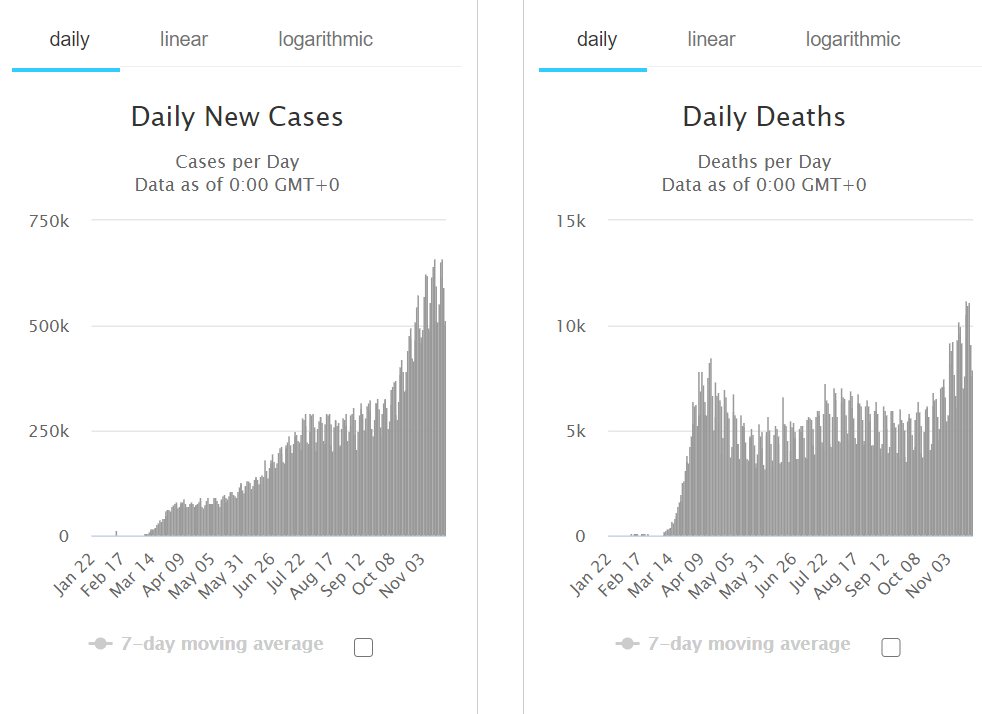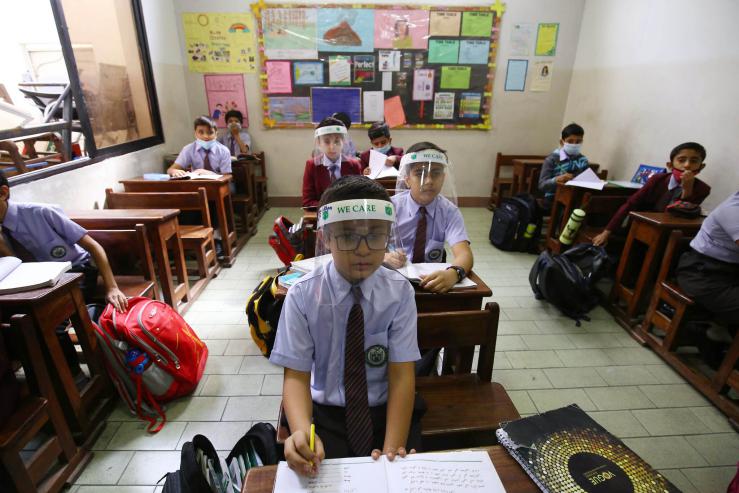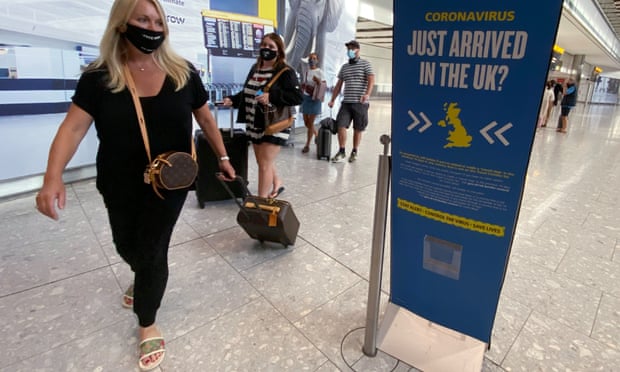
 i_need_contribute
i_need_contribute



|
Country, |
Total |
New |
Total |
|
World |
59,502,783 |
+503,182 |
1,401,571 |
|
12,777,371 |
+172,300 |
263,687 |
|
|
9,177,722 |
+37,410 |
134,254 |
|
|
6,088,004 |
+16,603 |
169,541 |
|
|
2,144,660 |
+4,452 |
49,232 |
|
|
2,114,502 |
+25,173 |
36,540 |
|
|
1,606,905 |
+8,599 |
43,131 |
|
|
1,527,495 |
+15,450 |
55,230 |
|
|
1,431,795 |
+22,930 |
50,453 |
|
|
1,374,631 |
+4,265 |
37,122 |
|
|
1,254,979 |
+6,562 |
35,479 |
|
|
1,041,875 |
+9,187 |
101,676 |
|
|
950,557 |
+887 |
35,641 |
|
|
946,648 |
+14,537 |
14,583 |
|
|
876,333 |
+15,002 |
13,774 |
|
|
866,821 |
+12,460 |
45,255 |
|
|
769,759 |
+2,080 |
20,968 |
|
|
635,689 |
+10,945 |
11,075 |
|
|
558,779 |
+1,875 |
15,618 |
|
|
542,080 |
+1,440 |
15,106 |
|
|
537,457 |
+2,136 |
11,996 |
|
|
502,110 |
+4,442 |
16,002 |
|
|
496,638 |
+4,375 |
7,360 |
|
|
489,818 |
+5,170 |
8,945 |
|
|
453,535 |
+6,713 |
12,511 |
|
|
449,760 |
+2,419 |
6,416 |
|
|
422,852 |
+4,207 |
10,177 |
|
|
420,614 |
+1,799 |
8,173 |
|
|
376,929 |
+2,756 |
7,696 |
|
|
355,489 |
+231 |
5,796 |
|
|
337,555 |
+5,713 |
11,521 |
|
|
329,998 |
+1,080 |
2,811 |
|
|
327,528 |
+2,587 |
5,396 |
|
|
264,802 |
+4,044 |
3,971 |
|
|
250,333 |
+3,145 |
2,459 |
|
|
222,288 |
+1,980 |
1,337 |
|
|
188,410 |
+4,981 |
2,302 |
|
|
185,944 |
+301 |
13,225 |
|
|
177,952 |
+3,334 |
3,891 |
|
|
160,055 |
+1,065 |
554 |
|
|
155,658 |
+875 |
2,973 |
|
|
143,978 |
+56 |
8,907 |
|
|
140,393 |
+337 |
868 |
|
|
Dominican |
138,829 |
+419 |
2,311 |
|
137,415 |
+186 |
236 |
|
|
132,358 |
+2,179 |
1,981 |
|
|
132,295 |
+618 |
1,641 |
|
|
126,709 |
+485 |
1,976 |
|
|
126,187 |
+5,067 |
1,237 |
|
|
126,182 |
+716 |
1,945 |
|
|
125,482 |
+1,483 |
1,104 |
|
|
124,966 |
+3,146 |
3,069 |
|
|
122,356 |
+275 |
1,386 |
|
|
118,722 |
+93 |
4,092 |
|
|
117,517 |
+1,041 |
911 |
|
|
113,381 |
+354 |
6,560 |
|
|
108,690 |
+3,958 |
1,012 |
|
|
106,203 |
+418 |
1,651 |
|
|
105,691 |
+1,973 |
1,398 |
|
|
104,915 |
+480 |
2,859 |
|
|
100,143 |
+308 |
873 |
|
|
98,418 |
+477 |
2,169 |
|
|
96,472 |
+231 |
693 |
|
|
95,281 |
+2,187 |
1,160 |
|
|
93,006 |
+1,387 |
1,714 |
|
|
89,196 |
+485 |
2,862 |
|
|
86,442 |
+11 |
4,634 |
|
|
85,886 |
+181 |
339 |
|
|
80,505 |
+1,259 |
1,765 |
|
|
78,473 |
+650 |
1,102 |
|
|
77,785 |
+413 |
1,392 |
|
|
77,072 |
+596 |
1,665 |
|
|
75,867 |
+1,005 |
2,294 |
|
|
73,196 |
+1,552 |
645 |
|
|
71,774 |
+157 |
604 |
|
|
71,654 |
+1,169 |
789 |
|
|
70,711 |
+250 |
2,023 |
|
|
69,885 |
+304 |
1,237 |
|
|
66,439 |
+56 |
1,168 |
|
|
65,778 |
+470 |
1,097 |
|
|
58,165 |
+5 |
28 |
|
|
56,659 |
+1,884 |
337 |
|
|
55,127 |
+384 |
1,546 |
|
|
50,941 |
+67 |
323 |
|
|
48,226 |
+1,192 |
392 |
|
|
37,719 |
+157 |
1,081 |
|
|
33,556 |
+795 |
716 |
|
|
33,183 |
+418 |
311 |
|
|
31,618 |
+556 |
444 |
|
|
31,111 |
+176 |
273 |
|
|
31,004 |
+271 |
509 |
|
|
27,835 |
+14 |
907 |
|
|
23,842 |
+314 |
435 |
|
|
21,936 |
+297 |
384 |
|
|
21,148 |
+10 |
131 |
|
|
8,947 |
+304 |
44 |
|
|
5,297 |
+1 |
116 |
|
|
3,920 |
+7 |
60 |
|
|
1,312 |
+5 |
35 |
Retrieved from: https://www.worldometers.info/coronavirus/
From CNN’s Yoko Wakatsuki in Tokyo
Japan reported eight coronavirus-related fatalities on Tuesday, bringing the country's Covid-19 death toll to 2,002.
The country also reported 1,522 new infections on Tuesday, with the total caseload now at 134,639, according to Japan's Health Ministry.
The number of seriously ill patients doubled in three weeks, from 160 cases on Nov. 1 to 330 on Monday.
Tourism scheme paused: Amid surging cases, the Japanese government is looking to partially suspend its subsided domestic travel campaign. The governors of Hokkaido and Osaka prefectures said Monday they agreed to the temporary suspension of discounted travel bookings in their capital cities of Sapporo and Osaka, where the infection rate is rapidly increasing.
Tokyo recorded 314 new cases on Monday while Osaka and Hokkaido reported 281 and 206 cases respectively.
Retrieved from: https://edition.cnn.com/world/live-news/coronavirus-pandemic-11-24-20-intl/index.html

Students in Karachi, Pakistan, on Monday.Credit...Shahzaib Akber/EPA, via Shutterstock
ISLAMABAD, Pakistan — Pakistan announced Monday that schools across the country will close for six weeks beginning Nov. 26 as the government confronts a sharp rise in new coronavirus cases. The positivity rate was 7 percent in the past 24 hours with at least 34 deaths, health officials said, a worrying increase compared to the past several weeks.
Students will continue taking classes from home until Dec. 24, said Shafqat Mahmood, Pakistan’s federal education minister, during a news conference in Islamabad on Monday.
“All educational institutions will be opened on Jan. 11, 2021, after reviewing Covid-19 cases situation in the first week of January,” Mr. Mahmood said, noting that winter break for students would begin Dec. 25 and end on Jan. 10.
This is the second time Pakistan has closed schools, resorting to at-home learning back in March and only reopening classrooms in September.
“If we don’t make important decisions now, there is a possibility that the spread of the virus will overburden the health care system,” Dr. Faisal Sultan, the special assistant to the Pakistan prime minister on health, said Monday.
Pakistan was spared the kind of devastation that crippled other countries this past spring, and officials had expressed optimism that they were prepared for the second wave. But a new wave of infections has now raised concerns about the government’s ability to counter the virus.
To date, there have been more than 376,000 recorded cases of coronavirus and nearly 7,700 deaths, according to a Times database. The current daily average number of new cases in Pakistan stands at 2,557.
Retrieved from: https://www.nytimes.com/live/2020/11/23/world/covid-19-coronavirus/pakistan-pauses-in-person-learning-until-january-2021

Demonstrators protested ‘Stay Home, Stay Healthy’ orders in Washington State in April.
Efforts to contain the coronavirus pandemic last spring quickly became politicized, forcing officials and citizens around the world to choose between public health and personal freedom. In the United States, the tension broke down roughly along ideological lines, with many blue states taking containment measures seriously, and red states less so.
In a new analysis, a team of researchers provided some of the first hard evidence of how the political divide drove behavior. The paper, posted Monday by the journal Nature Human Behavior, found that one measure of partisan hostility — the intensity of distrust and animosity toward the other side, red or blue — correlated both with people’s attitudes toward containment policies, and how they behaved.
The findings were based on interviews with more than 2,400 adults, conducted once in the summer of 2019 and again in April of this year.
The research team, led by James Druckman, a political scientist at Northwestern University, found that the average Democrat “is more worried, is more likely to have changed behaviors and is more supportive of policies to stop the spread of infections than the average Republican,” although there were substantial overlaps in attitudes.
The research team, which included scientists from the University of Arizona, Stony Brook University and the University of Pennsylvania, determined that in the hardest hit areas, these differences shrank. In effect, concern for personal and family safety blunted the effect of partisanship, as most everyone responded to the local outbreak.
“These findings have implications for understanding how best to combat COVID-19,” the authors concluded. Since partisan hostility underlies partisan gaps, “policymakers will need to devise different strategies to bring the parties together on these issues.”
Gwyn Topham Transport correspondent

Passengers arrive at Heathrow airport in September. Anyone entering the UK will still have to self-isolate for five full days before taking a test. Photograph: Yui Mok/PA
The two-week quarantine period for international arrivals to England is to be cut to as little as five days next month, with travellers allowed to leave self-isolation after a negative Covid-19 test.
The government said the new “test to release” regime would be in place from 15 December.
Airlines said it was “light at the end of the tunnel” for the struggling travel industry, but said most travel would only return when a pre-departure testing regime was in place.
Passengers who choose to use the scheme must book a test before travel – and pay for it privately – from a list of government-approved suppliers, which has yet to be published. The cost is likely to be between £65 and £120.
Anyone arriving in England by plane, ferry or train will still need to complete a passenger locator form and self-isolate for five full days before taking a test.
The transport secretary, Grant Shapps, said the plan would “ensure that our route out of this pandemic is careful and balanced, allowing us to focus on what we can now do to bolster international travel while keeping the public safe.
“Our new testing strategy will allow us to travel more freely, see loved ones and drive international business. By giving people the choice to test on day five, we are also supporting the travel industry as it continues to rebuild out of the pandemic.”
A travel taskforce, chaired by Shapps, reported to the prime minister earlier this month. Shapps’ view is that a test after five days of self-isolation would give more accurate results and reduce the risk of false negatives, compared with a test on arrival favoured by airlines and airports. The government has pointed to the examples of Germany and Iceland, which amended test-on-arrival regimes in favour of a similar delayed test.
Both British Airways and Virgin described the move as a significant step in the right direction, but said a pre-departure testing regime was needed.
Airlines UK said the move should cause a tentative rise in demand. Tim Alderslade, the industry association’s chief executive, said: “That said, a test at day five does not get rid of quarantine and that’s why we look forward to working with government to move towards a pre-departure or domestic testing regime. But there is now light at the end of the tunnel.”
The travel association Abta said it would make travel more attractive and manageable but there was “still more work to be done to support the recovery of the sector, including having a testing scheme in place for Scotland, Wales and Northern Ireland.”
The International Air Transport Association (Iata) said momentum was building worldwide for testing to replace quarantine. Its chief executive, Alexandre de Juniac, said: “Encouraging results from testing pilot programmes should now give states the confidence to move forward quickly.”
Iata said it was finalising a digital “travel pass” that could, with governments’ agreement, allow passengers to store all vaccination or testing information along with travel documentation and tickets, allowing more contactless travel at airports and reducing the risk of the virus spreading.
Meanwhile, the UK government has announced more financial support for struggling airports and ground handlers in England with a scheme, starting in 2021, that would address fixed costs and be equivalent to their business rates.
With a cap of £8m per business, it is likely to be welcomed by smaller, regional airports but represents a fraction of the money sought by Heathrow, which has been lobbying to waive its rates bill of more than £100m annually.
The aviation industry has criticised the lack of government assistance, after hopes were raised by the chancellor, Rishi Sunak, early in the pandemic that bespoke help would be offered. However, Sunak said the government had supported the industry “throughout this crisis through the job retention scheme, loans and tax deferrals”.
Retrieved from: https://www.theguardian.com/world/2020/nov/24/test-to-release-cut-england-travel-quarantine-five-days

Pedestrians wearing protective masks walk under the Christmas and New Year colour-changing illuminations in Rua Augusta during the COVID-19 Coronavirus pandemic on 23 November 2020 in Lisbon, Portugal.
The WHO said Monday that avoiding family gatherings would be “the safest bet” over Christmas, insisting there is no zero-risk option for traditional holiday merry-making during the coronavirus pandemic.
World Health Organization officials said it was down to governments to weigh up the economic and social benefits of loosening pandemic restrictions over the festive period, while individuals would have to decide whether they might be putting more vulnerable relatives at risk.
Europe and the Americas are battling rising coronavirus caseloads that are pushing health systems to the brink, forcing governments to issue stay-at-home orders and close businesses heading into the crucial Christmas period.
Maria Van Kerkhove, the WHO’s Covid-19 technical lead, said there were no “zero-risk” options.
“There’s lower risk or higher risk - but there is a risk,” she told a virtual media briefing.
“This is incredibly difficult because especially during holidays... we really want to be with family but in some situations, the difficult decision not to have that family gathering is the safest bet.”
She said everyone would have to take that decision for themselves, weighing up whether they could potentially be bringing the virus into the home of more vulnerable individuals with a higher risk of dying from the disease.
Van Kerkhove suggested that connecting virtually might be the way to go.
“Even if you can’t celebrate together this year, you can find ways to celebrate when this is all over,” the US expert said.
“We are doing that within our own family and we are going to have one heck of a celebration when this is all over.”
The World Health Organization said Monday it had received reassurances from Beijing that international experts would soon be able to travel to China to help investigate the animal origins of Covid-19, AFP reports.
“We fully expect and have reassurances from our Chinese government colleagues that the trip to the field... will be facilitated, and as soon as possible,” WHO emergencies director Michael Ryan told a virtual press briefing.
“We need to be able to have the international team join our Chinese colleagues... and look at the results and the outcomes of (their) studies and verify the data on the ground,” he said.
Ryan hailed the “tremendous amount of scientific investigation” done by the Chinese, but said international experts needed to go in “in order that the international community can be reassured about the quality of the science.”
“This is extremely important, and we are continuing to expect that that be the case.”
The WHO has for months been working to send a team of international experts, including epidemiologists and animal health specialists, to China to help probe the animal origin of the novel coronavirus pandemic and how the virus first crossed over to humans.
The UN health agency sent an advance team to Beijing in July to lay the groundwork for the international probe, but it has remained unclear when the larger team of scientists would be able to travel to China to begin epidemiological studies to try to identify the first human cases and their source of infection.
Scientists initially believed the killer virus jumped from animals to humans at a market selling exotic animals for meat in the city of Wuhan, where the virus was first detected late last year.
But experts now think the market may not have been the origin of the outbreak, but rather a place where it was amplified.
· International virus sleuths expected to go to China soon: WHO. The World Health Organization said Monday it had received reassurances from Beijing that international experts would soon be able to travel to China to help investigate the animal origins of Covid-19. “We fully expect and have reassurances from our Chinese government colleagues that the trip to the field... will be facilitated, and as soon as possible,” WHO emergencies director Michael Ryan told a virtual press briefing.
· The WHO also said Monday that avoiding family gatherings would be “the safest bet” over Christmas, insisting there is no zero-risk option for traditional holiday merry-making during the coronavirus pandemic.
· England to cut quarantine period for arrivals from abroad. Travellers arriving in England from abroad face a shorter spell in quarantine from mid-December if they test negative for coronavirus five days after their arrival, the UK government announced Tuesday. It hopes the new rules will revive the ailing travel industry, particularly aviation, which has suffered a steep drop in ridership because of restrictions imposed to fight the pandemic.
· Japan’s government is preparing to pause its domestic travel campaign in two cities following sharp rises in Covid-19 cases, the minister handling the government’s coronavirus response said on Tuesday.
· Border restrictions ease in Australia. The border between NSW and Victoria (the worst affected state in the country) opened earlier this week, and this morning, Queensland has announced its barrier to NSW will come down on December 1. NSW and Queensland have been isolated for most of this year, the first time the country’s internal borders have been closed since the Spanish Flu.
· Daily Covid-19 cases in France at near two-month low. France reported 4,452 new Covid-19 infections on Monday, the lowest daily tally since 28 September, suggesting a second national lockdown is having an impact.
· UK aims to inoculate those most at risk from Covid by Easter. The British prime minister, Boris Johnson, said he hoped almost all Britons at high risk from Covid-19 would be vaccinated against the disease by Easter. He also said people will not be forced to have vaccinations against Covid-19.
· Spain’s king self-isolating after virus contact. Spain’s King Felipe VI has started 10 days of quarantine after coming into close contact with someone who later tested positive for Covid-19, the palace said.
· Pope says anti-maskers stuck in ‘their own little world of interests’. Pope Francis has12taken aim at protests against coronavirus restrictions, contrasting them with the “healthy indignation” seen in demonstrations against racism after the death of George Floyd.
· New infections in Gaza spiralling out of control. The mounting number of coronavirus infections in densely populated Gaza is spinning out of control, Palestinian health officials warned. Bassem Naim, a senior Hamas official, said the health ministry “expects the worst if the epidemiological situation remains the same” citing “a health system at the end of its rope”, “severe drug shortages” and “extreme overcrowding”.